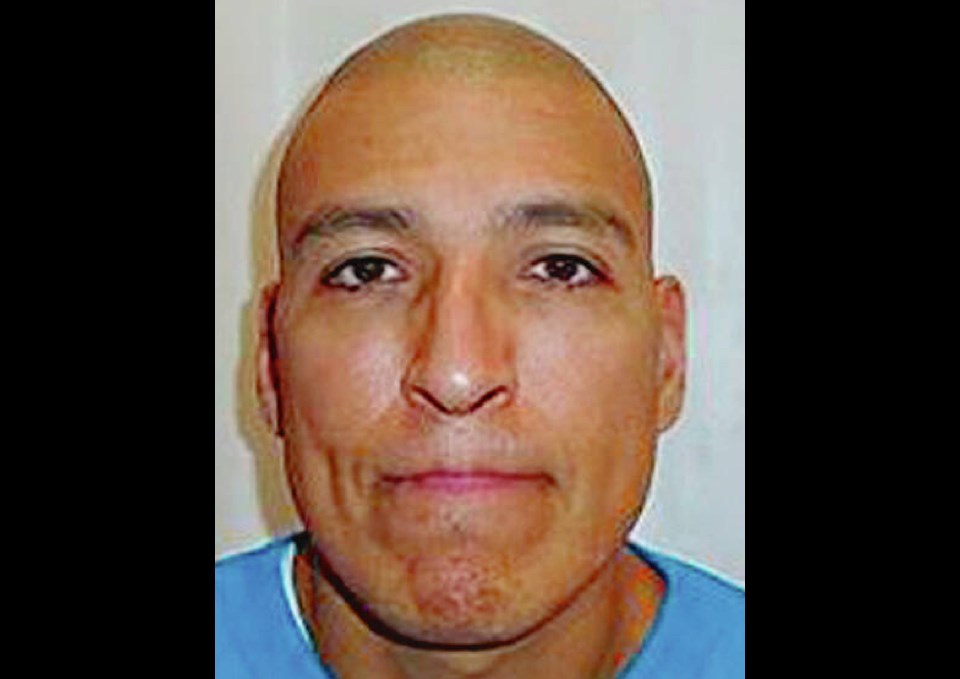Warning: This story contains graphic details of a violent attack.
A B.C. Supreme Court jury is sequestered and deliberating whether James Lee Busch — one of two inmates who escaped from William Head Institution — is guilty of the first-degree murder of a Metchosin man three years ago.
Martin Payne, a 60-year-old provincial government mail carrier and father of two, was murdered when he returned home after work on the afternoon of July 8, 2019.
Busch’s lawyer Ryan Drury called the Crown’s case “weak” and “speculative,” saying there’s insufficient evidence to conclude Busch was in the residence or involved in the unlawful confinement or murder of Payne, or in any way aided his co-accused, Zachary Armitage.
At the start of the five-week trial, Armitage was also on trial for the first-degree murder of Payne, but on Nov. 29, Justice David Crossin told the jury that Armitage “has been dealt with in a separate way and will no longer be a party in this trial.”
Drury said the forensic evidence against Busch is minimal, but there is a “substantial and overwhelming body of evidence” against Armitage that points to his guilt.
While there are some items found at Payne’s residence with Busch’s DNA on them, there’s no explanation of how they got there, said the defence lawyer, who urged the jury to conclude there are other reasons that point to Busch’s innocence.
He suggested Armitage may have used Busch’s possessions to clean up the crime scene or Busch may have helped Armitage clean up the crime scene.
“Assisting with the cleanup of the crime scene after the fact does not make someone guilty of murder, or guilty of manslaughter,” said Drury.
None of Busch’s fingerprints were found on the alleged weapons. The New Balance shoes he was wearing “are virtually bloodless,” compared to the blood-covered Asics worn by Armitage, Drury said.
“He is a guy who is at the wrong place at the wrong time.”
The jury has heard that Payne died from multiple sharp and blunt force injuries. Payne was stabbed in the neck with a bowie knife and sustained a wound so deep it severed the arteries on both sides of his neck and injured his trachea and his cervical spine. The wound was fatal.
Payne was also struck on the head several times with a hatchet. The blows fractured his skull and penetrated his brain. The chopping injuries were inflicted while Payne was still alive, and could also have been fatal, the jury heard.
Another smaller knife was used to inflict a small, deep stab wound on Payne’s left shoulder. Duct tape was found on Payne’s right forearm and on his right leg,
The Crown’s theory is that Payne was murdered by both Armitage and Busch, inmates who walked away from William Head at low tide on July 7, 2019.
Payne left his house for work the next morning around 6:20 a.m. By 6:57 a.m., his computer was being used to search for stories about the escape. Armitage used Payne’s phone to call a private water taxi service. He also called two friends asking for help, some money and a ride, but neither wanted to become involved.
The Crown believes Busch and Armitage planned to use violence to get the PIN or private code for Payne’s bank card. They cut the heads off two axes, found duct tape to tie Payne up with and had the hatchet and bowie knife ready.
When Payne arrived home just before 3:30 p.m., they attacked him with the deadly weapons. It took two people to kill the five-foot, 10-inch tall, 200-pound Payne, said prosecutor Chandra Fisher. Payne was attacked from behind with the hatchet and from the front with the bowie knife. One man held Payne down while the other tried to wrap duct tape around him, she said.
After the murder, the two men tried to clean up the evidence, attempting to wipe the blood off themselves and their clothes. They placed towels, blankets, washcloths, shoes, and gloves into garbage bags in the bedroom.
Busch and Armitage planned from the beginning either to kill Payne or to unlawfully confine him and ended up killing him in the course of that confinement, said Fisher.
Murder is considered first degree when it’s planned and deliberate, or when it’s caused by a person committing or attempting to commit another offence, such as unlawful confinement.
Forensic evidence revealed that Armitage left his fingerprints on a glass in the kitchen and on a duct-tape dispenser in the master bedroom. His palm print was also on a note saying “What is your pins for cards” that was found by Payne’s computer.
Busch’s fingerprints were not found in the home, but DNA from both men was found in the house.
Armitage’s DNA was found on a white shirt, a white leather glove and a sock found in a garbage bag. Payne’s blood was on those items. Armitage’s DNA was found on chewing gum in the bathroom.
Busch’s DNA was found on two pairs of underwear and on the inside of a New Balance shoe. Payne’s blood was found on the left thigh of one pair of underwear.
Fingerprints from both Busch and Armitage were found on a newspaper in Payne’s truck, which was discovered in Oak Bay the day after the escape.



